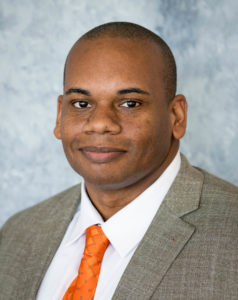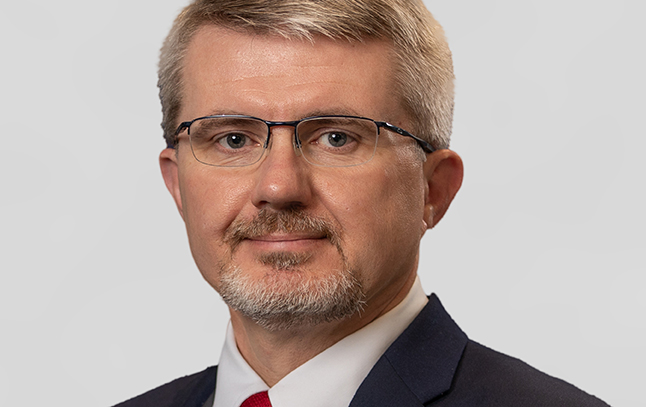
Commissioner Wayne D. Lewis
The most important school factor in a child’s academic success is having access to high-quality, effective teachers. While we have continually sought to improve the quality of instruction provided to students, particularly those who have been historically underserved, we are now facing teacher shortages in Kentucky and across the nation like we never have before.
The factors influencing the shortages are numerous and not the topic of this column, but suffice it to say that the teacher shortages in some regions of the state and in some high demand content areas threaten the core business of teaching and learning in Kentucky schools. The shortages are particularly challenging in such critical areas as special education, career and technical, science and mathematics.
The Kentucky Department of Education (KDE) must play a leadership role in addressing our teacher workforce challenges.
As we develop and implement strategies for recruiting more Kentuckians into traditional teacher preparation programs in Kentucky’s colleges of teacher education, we also must work to recruit experienced professionals into classrooms as teachers through our alternative routes to teacher licensure. Every year, talented professionals whose college major and first career was not education enter the teaching profession and Kentucky classrooms. In many cases, these teachers are placed in some of our hard-to-staff schools and teaching areas. We would benefit from having many more of them.
To that end, it is important that we do a better job of sharing information with prospective non-traditionally trained teachers about the many alternative routes to the teaching profession available in Kentucky. There are currently eight options or alternative routes to teaching that permit individuals to pursue teacher certification in Kentucky:
- Exceptional Work Experience (for teachers grades prekindergarten through 12): Candidates with exceptional work experience in an academic content area who have a minimum of a bachelor’s degree with a 2.75 grade point average (GPA) may be eligible for this pathway.
- College Faculty (for teachers grades 8-12): Candidates who have a minimum of a master’s degree in an academic content area and have at least five years of full-time teaching experience in the content area at the college level may apply for 8-12 certification for the specific content under this route.
- Local District Training Program (P-12): There are no current local district training programs approved by the Education Professional Standards Board (EPSB) at this time.
- Adjunct Instructor (P-12): The Adjunct Instructor Certification does not lead to professional certification in Kentucky. However, it does allow those who have expertise and a minimum of a bachelor’s degree with a major or minor in an academic content area and meet other qualifications to teach part-time on a contract basis.
- Veterans of the Armed Forces: A pathway to certification for veterans with at least six years of eligible military service and an honorable discharge who have a GPA of at least 2.75 and a minimum of a bachelor’s degree in an academic content area or meet PRAXIS requirements.
- University-Based Alternative Route (P-12): This option is for individuals who hold a bachelor’s or master’s degree in a nonteaching major interested in attaining initial teacher certification, meet university admission requirements and have a GPA of at least 2.75.
- Institute Alternative Route: There are no current institute alternative routes approved by the EPSB at this time.
- Teach for America: A national nonprofit organization that recruits, trains and supports outstanding recent college graduates for career placement in participating school districts within the Appalachian Region of Kentucky.
At KDE, we have a number of programs and initiatives intended to assist with the recruitment of talented people into the teaching profession. One of our newest initiatives is the Kentucky Academy for Equity in Teaching (KAET), a program designed to identify, support and prepare a talented and diverse teacher candidate pool. In partnership with educator preparation programs at Kentucky’s public and private colleges and universities, KAET experiences will assist in preparing candidates for the diverse Kentucky schools and communities where they will serve.
Through the program, KAET participants receive financial support through a forgivable loan, and complete an Education Professional Standards Board-approved teacher education program in conjunction with ongoing mentorship by experienced Kentucky educators. The program is funded by a $1 million per year allocation in the 2018 Kentucky state budget for educator quality and diversity through the teacher recruitment and retention program. I am thankful to the Kentucky General Assembly and the governor for their continued investment in this work.
While KAET is aimed at helping students overcome financial barriers that may keep them from the teaching profession, at KDE we’re also working to recruit even younger people into teaching, beginning at the high school level. The Teaching and Learning pathway – which began during the 2017-2018 school year – is designed to allow more schools to offer an education pathway, appeal to more students and allow students to get classroom experience sooner.
The pathway includes four courses. All students in the pathway take the first three courses, which focus on the general theory and practice of learning and teaching, the basic principles of educational psychology, the art of teaching, planning and administration, school safety and health issues, and the social foundations of education. For the fourth course, students can choose from Collaborative Clinical Experience, Principles of Career and Technical Education or an AP or dual credit course in their intended discipline.
During the 2018-2019 school year, there were 35 schools offering the Teaching and Learning Pathway, with 1,150 students enrolled. I had the opportunity to spend time with many of these students recently in Bowling Green at the state Educators Rising conference at Western Kentucky University. These are incredibly talented and passionate young people, and I am confident that among them are future Kentucky teachers who may not have selected teaching if they hadn’t had the opportunity to explore teaching as a career possibility through this pathway.
Addressing our current critical teacher shortages will require that we fundamentally reconsider recruitment and retention in the teaching profession, including asking tough questions about the profession and its attractiveness to younger generations of professionals. What will take even more courage is using what we learn to make adjustments as needed to teacher recruitment, training, career ladders and benefits packages. We cannot continue to do things the same way and expect to recruit and retain passionate, talented and effective instructional experts for each and every Kentucky student.



I agree with both Dr. Lewis as well as all of you who have commented. No one has made any invalid points. However, we live in a capitalist economy, do we not? Pay and benefits must be taken into consideration when attempting to address this issue. Of course, the latter factors are not the whole story behind our growing teacher shortage. What do young people in high school and college–as well as other professionals we would like to enter the classroom–see in the news regarding public education almost every day? An embattled profession that is asked to do more with less–and for less pay and with less job security–every single day. A profession that seems to have been criminalized by many of our elected leaders. The current toxic political situation will only serve to make matters worse; if we do not address it–as well as pay and benefits–we will only see the teacher shortage grow.
The time to deal with this is now, my fellow Kentuckians. There can be no delay.
I love the article and appriciate that you we are looking for alternative ways to introduce professionals to the teaching profession. However there is one alternative route that has not been though of that very well may be taking out a good population of quality teachers. The teachers that decide to stay home with their children for the first 6 to 8 years struggle to make it back to the classroom because if their teaching certificate expires they can’t afford to pay for the 6 graduate hours to get it renewed. Especially if they have already completed their masters previously.
This is me, I have tried to get back into a public classroom. I did finally find a free grad class from the University of Kentucky this summer but still I will have to find one more before I can get my six hours complete.
I think this is a problem because when we decided to stay home there is a whole lot of professional development that is going on for that teacher by staying home and recognizing what parents actually do to try and help the education system. In addition the things that these teachers lose over the years they are out will not be taught in a graduate course but will be taught to them with the many new changes that have taken place with in the district they work. Examples of these changes would be Landschool, google classroom, Infinite Campus, and simple policies that can only be taught through the district in letting their employees know what is going on today. Yet hire teachers that do not have the classroom management experience as say I do simply because they are they are fresh out of school or such. This really bothers me. I plan to finish my 6 grad hours over time as I find free courses such as the one that I happened up on for this summer.
Thank you for thinking of alternative ways to bring good teachers to the profession. Is there anything you can do to find an alternative to bringing in these individuals. My suggestion is that you allow districts to let these former teachers take the professional development that would get them up to date and that their district offers in place of the 6 grad hours.
I know that you can use professional development hours but my understanding is that if your certificate has expired you can not and must take 6 grad hours.
Agreeing with Ms. Clancy … exceptional teaching is much more than throwing out content and hoping some of it sticks. It takes an altruistic vision, love of learning and compassion … as well as, some intelligence and unbridled optimism. Treating teachers as the professionals they are would help.
Mass recruitment of generally anyone with a Bachelor’s degree (easy to come by these days!) and a sterling 2.75 GPA will only hasten the future of a digital solution and inevitable privatization of education ($$$).
Shortage of quality educators is a serious and long-term problem. These days, I rarely if ever hear any of my high school students say they are interested in becoming a teacher … especially in the toxic educational environment that exists today in education!!!
I want a refund for the Masters degree I had to get fifteen years ago. Education is quickly adopting a “take anyone” approach to staging schools. Pay the professionals you already have and teacher shortages won’t be a problem.
I believe with the social security the way it is in KY people may not want to start a second career in teaching.
Sir, the only thing that’s going to increase The number of Teachers In Kentucky is to increase our pay, treat us like professionals, and let us teach without one test determining our future when frankly, there are so many factors that determine a student’s test score that you cannot possibly allow teachers to gain money because of what they have accomplished. And certainly you should not punish teachers because of what a student fails to accomplish due to the many factors involved.
Seriously sir, is this the best you can come up with? That you were going to use test scores and money and we go right back to the days where the test dictates everything.
If you want to retain Teachers or you want to gain new teachers, then you need to increase our pay and guarantee our retirement that we were promised by law.